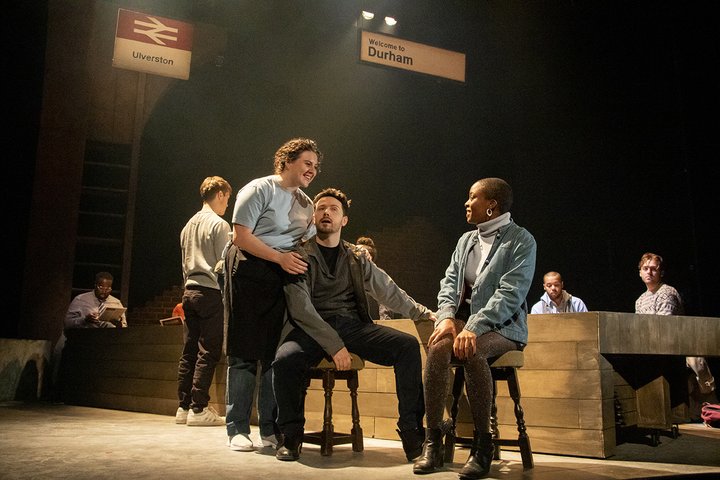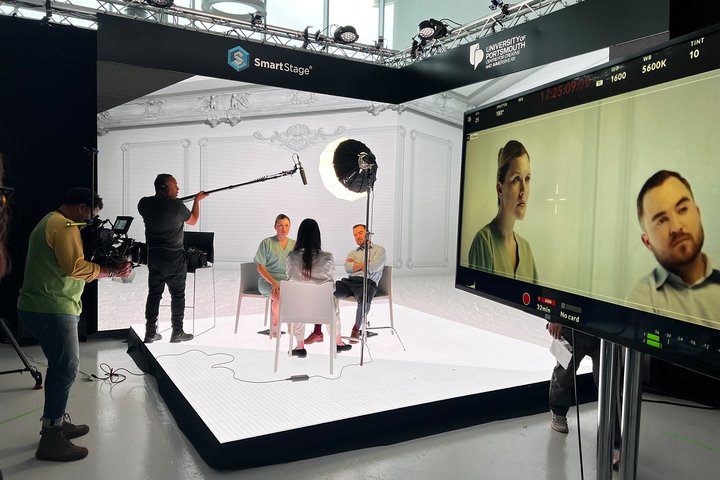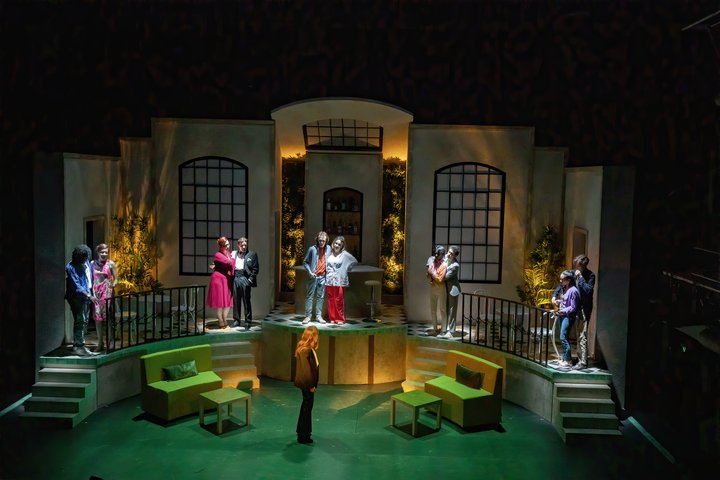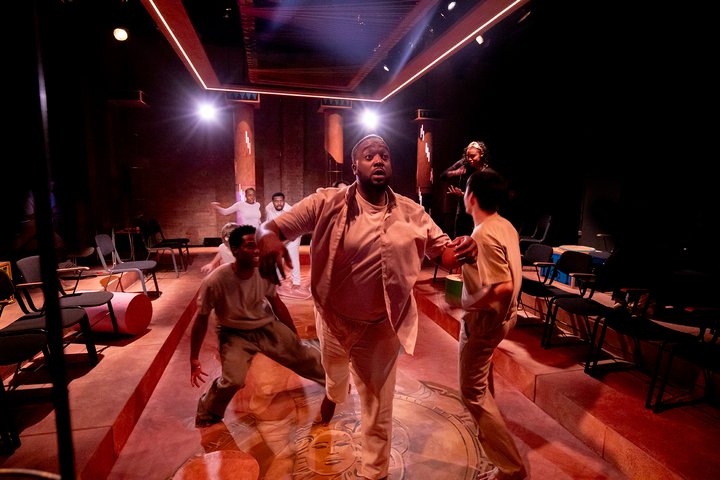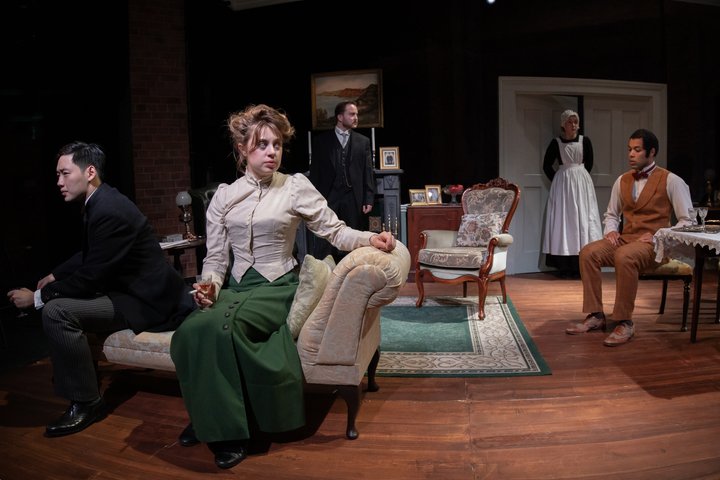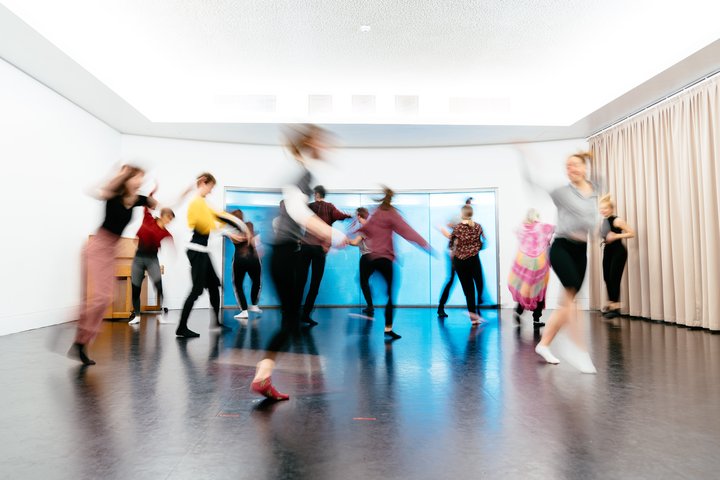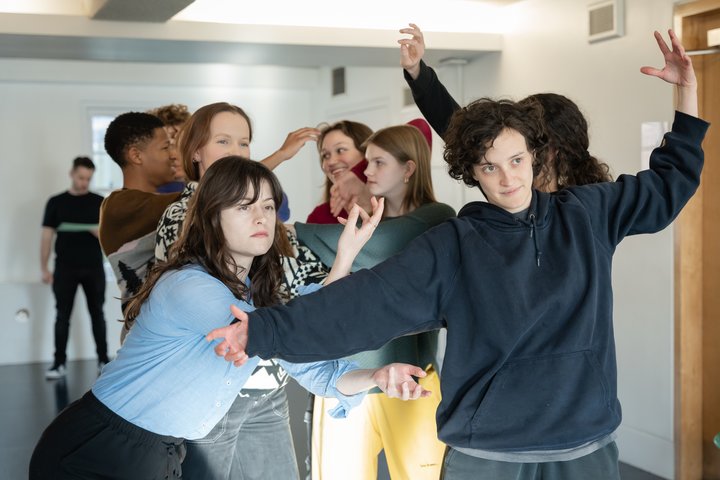BA (Hons) in Acting
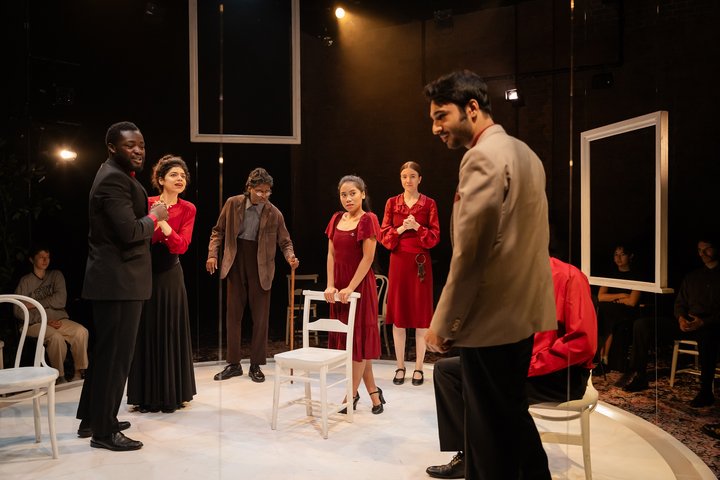
We enable actors to thrive in classical and contemporary theatre, film, television, radio and digital media.
Through a combination of studio-based classes, professional development, and public performances and screenings, our training will support you to become a versatile, playful, and resilient actor.
Responding to a continuously evolving industry, you will develop your individual practice, work collaboratively and be empowered to explore new ideas.
At RADA you will grow into a reflective, socially engaged artist with the skills to establish a career in the creative industries.
Working in a supportive and equitable environment with creative collaboration at its heart, you will graduate with the potential to become a leader and change-maker in the arts.
At RADA, we aim to nurture your talent and potential through rigorous, immersive training that encourages your personal and professional development.
Through classes in voice, movement, acting techniques, film, singing, text analysis and contextual studies, you’ll undertake a practical and reflective training that develops embodied understanding and skills in the craft of acting.
Over three years, the course will enable you to:
- Cultivate your vocal, physical, emotional, creative, and imaginative skills for professional acting.
- Build a strong theoretical and practical understanding of classical and contemporary performance across various contexts.
- Develop reflective, critical thinking and research skills applicable to performance and beyond.
- Enhance your ability to work collaboratively, empathetically, and independently.
- Engage with the creative industries throughout your training.
- Foster communication, ensemble ethos, and resilience applicable across performance contexts.
- Be courageous, curious and socially engaged in your work.
For more detailed information on course content, assessment and outcomes, download our Programme Specification.
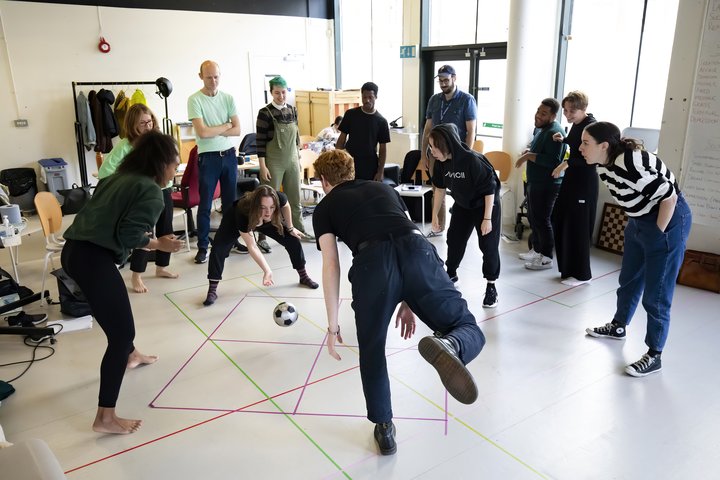
Timetable and workload
This programme is taught in-person, with at least 35 contact hours per week on average. You will also spend time each week in self-directed study, including research, practice, creative tasks, writing, reading, and line-learning.
Training is mostly onsite at RADA with occasional online and offsite sessions.
In your third year, production periods may require longer hours, including evenings and weekends.
You can find our term dates here.
Assessment
You will be assessed throughout the course on your progress in various subjects, projects, and productions, culminating in public performances in the third year.
Feedback is provided through tutorials, notes, and written assessments. You must pass all components to complete the program, and the third year is graded.
The programme awards include:
- BA (Hons): For completion of levels 4, 5, and 6 with 360 credits.
- Diploma of Higher Education (DipHE): For completion of levels 4 and 5 with 240 credits.
- Certificate of Higher Education (CertHE): For completion of level 4 with 120 credits.
Year 1
The first year focuses on exploration, with an emphasis on process rather than performance. You will explore various acting techniques (based on Stanislavski and related practitioners), voice, movement, screen acting, improvisation, and more.
Classes include:
- Acting techniques
- Screen acting
- Improvisation
- Movement
- Voice and speech
- Singing
- Combat
- Dance
- Text and scene study
- Dramaturgy
- Alexander Technique
- Reflective practice
- Acting history
You will engage in showings and share your work with students from other courses and staff. To help give a broader context to your work, we invite a number of guest speakers from a wide range of industries and walks of life including politics, arts, science and social justice.
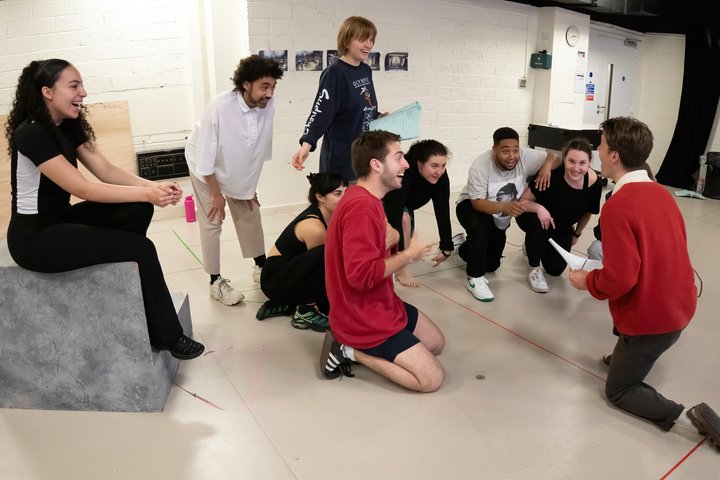
Year 2
In the second year, you will focus on integrating and refining your skills, developing greater independence and resilience as an artist. Workshops and panels featuring industry professionals will continue your professional development, encouraging you to think about your role as an actor in the industry.
Your acting training will deepen the techniques learned in the first year, including screen acting. You will build on improvisation techniques and explore devised theatre, encouraging you to lead your own creative work. Voice classes will explore more complex speech systems via playful vocal investigation, reflection and text analysis, and singing classes will help you build your repertoire. Classes in movement will continue developing your skills in exploring the physical life of a character and advance your dance and fight skills.
Second-year projects will enable you to apply your training in performance. Public performances will include appearances at RADA and London secondary schools, as well as participation in international festivals such as META, the Gdansk International Shakespeare Festival, European Forum Alpbach, and the Utah Shakespeare Festival.
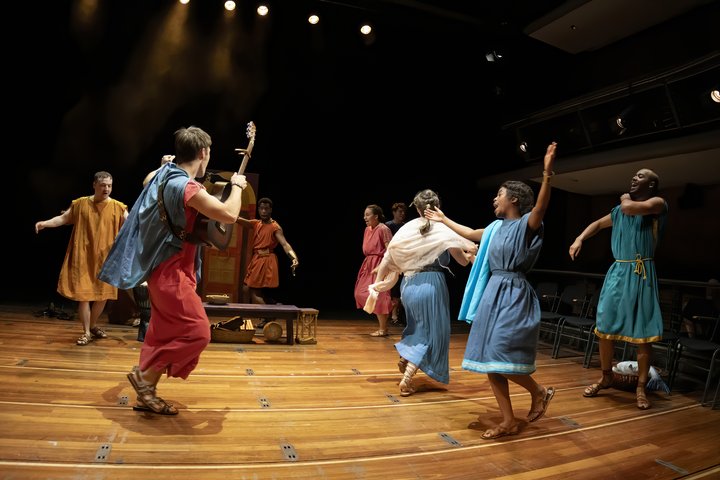
Year 3
In your final year, you will focus on applying your skills in performance and refining your personal creative practice.
Working on a series of stage, film, and audio productions, you will gain experience in rehearsing and realising performances in a supportive, professional environment. These productions are collaborative, and you will work extensively with Technical Theatre Arts students to prepare performances for industry professionals and the public. Casting is designed to challenge and stretch your skills across various roles and performance spaces.
Film and audio productions play a significant role in our training. RADA commissions professionally written scripts for short films, enabling you to refine your craft both in front of and behind the camera. These films will be showcased at screenings for industry and public audiences. In audio craft, you will develop skills in microphone technique, voice acting, audio drama, and more, with opportunities to participate in projects directed by industry professionals and to produce commercial voice-over demo reels.
In addition to productions, you will continue classes in voice and movement, acting, singing and reflective practice, as well as ongoing professional development. Voice and movement support is part of all productions and may include combat, singing and ensemble work, as required. During production periods, evening and weekend work is often required.
Professional development
Throughout the course, professional development is a key focus, with seminars and workshops led by agents, casting directors, producers, and actors. You will learn about the practicalities of freelancing, self-taping, auditions, and more, to build resilience and confidence as you enter the industry.
In the third year, students benefit from the RADA Buddy mentoring scheme, connecting with graduates for advice and networking opportunities.
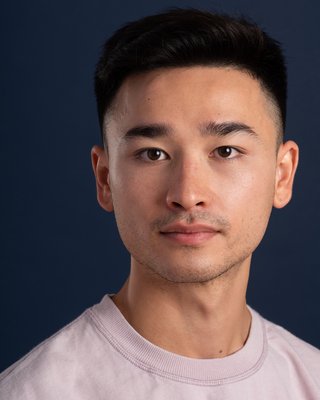
We encourage applications from people of any age, gender, disability, ethnicity, marital status, nationality, sexual orientation, parental status, socio economic status, religion or belief. We are committed to promoting equality and diversity, to pursuing non-discriminatory policies and practice, and eliminating unfair discrimination. We audition everyone who applies.
Entry requirements
Applicants must:
- be 18 years of age on the first day of the induction week in the year that you start your programme of study
- have complete fluency in spoken and written English
- demonstrate an intellectual, creative and practical ability to undertake degree level training.
- be able to talk enthusiastically about your passion and experience at interview
- be able to show an understanding of the nature of the work.
We require you to have achieved a standard of education which means you can study for a degree, but we do not require specific A levels or other qualifications.
English is not my first language. How is fluency in English assessed?
Find out more about our English Language requirements here.
How to apply
Complete the online application form at the top of this page. If you need some more information, you can read our guide to the application form.
Once you have submitted your application form, you will have two weeks to upload your self-tape video. You can find out more about self-tape auditions at RADA, setting up, and recording below. You may only apply once per academic year.
There is an application fee for the BA (Hons) in Acting of £39. This covers the cost of processing and progressing each individual application. Application fees are not refundable.
You may be eligible to apply for free through our RADA Connect programme.
Admissions process
Our audition process is rigorous, spanning several months. Owing to the number of applicants we audition, we do not routinely provide feedback.
The information below explains each stage of the process; you can read more details about the process, what speeches to prepare, and how we support disabled applicants in our admissions procedure guide.
Information for disabled applicants
We welcome applications from disabled applicants and encourage them to disclose relevant information regarding any disability when completing their application form, to enable us to provide additional support during the admissions process.
Find out more about the ways RADA support disabled applicants in our Student Life pages.
If you are a disabled applicant and would like further advice or guidance, please contact the admissions team directly on admissions@rada.ac.uk.
Auditions
The four audition stages
- Preliminary Audition: October to February
- Second Round: November to March
- Short Workshop (three-hour session via Zoom): Feb to April
- Full Workshop Day: April
Preliminary Audition
Your self-tape video is your preliminary audition. You are required to submit one classical and one contemporary speech (alongside an introduction). In the first stage, your self-tape will be seen by two members of the audition panel.
Second Round
Successful applicants will be required to submit a second self-tape comprising of a different classical speech, plus a song (verse and chorus only). This will be seen by a recall panel consisting of three panel members.
Short workshop
A three-hour online workshop. You should be prepared to perform both of your classical speeches and your contemporary speech from earlier rounds. The workshop leader will pick one of your classical speeches for you to perform.
You will work with a director on your speech to explore fully the material and opportunities within it. The director will be looking for an imaginative response to the text and character, physical and vocal adaptability, and the ability to take direction.
Full workshop day and interview
All final round workshops will take place in-person at RADA.
This is the final stage and you will need to prepare a new audition speech of your choice. It can be from any era, Greek to contemporary. We need to see a speech you have not shown or worked on in earlier stages.
Other sessions include movement, voice and scene study.
You will then have an individual interview with a senior panel member, lastly approximately 15 minutes.
Our intention is that the day is relaxed and enjoyable so that, regardless of the outcome, you will have had an enriching experience.
Your preliminary self-tape
At the preliminary stage, we ask you to submit a self-tape video, consisting of two audition speeches (one classical, one contemporary) . Each speech should last up to two minutes. We would also like you to give a brief introduction (name and postcode) and explain why you have chosen your pieces (one minute).
Speech A - Classical
The classical piece should be from Shakespeare or an Elizabethan/Jacobean playwright (Jonson, Marlowe, Webster, etc.). It should be originally written in English - so do not choose a piece from a Greek tragedy or a Molière comedy, for example. You can perform a monologue in your native language (mother tongue) if you prefer, but it must be accompanied by the same piece performed in English.
Speech B - Contemporary
The contemporary piece should provide a clear contrast to the classical pieces and be written after 1960.
For advice on setting up and filming, read our self-tape guide.

Tuition fees
Undergraduate fees for the academic year 2024-26:
Home (UK) students
£9,250 per academic year
International
£23,940 per academic year
Undergraduate fees for the academic year 2025-26:
Home (UK) students
£9,535 per academic year
International
£23,940 per academic year
Please see the fees policy for more information about how RADA calculates tuition fee increases for each year of a course.
Find out more about funding your training.
Am I a Home (UK) or International student?
There are strict regulations regarding residency which must be met in order to qualify for Home (UK) student status.
Home (UK) student
In order to be classed as a Home (UK) student you normally need to meet all of the following criteria on the first day of the first academic year of the course:
- You are settled in the UK (this means there is no immigration restriction on the length of your stay).
- You are ordinarily resident in the UK, and have been for the full three years before the first day of the academic year (ordinarily resident means that your main home is in the UK, and you are choosing to live in the UK).
- The main reason for you being in the UK was not to receive full-time education.
Irish nationals who have been living in the Republic of Ireland or the UK can qualify for Home fees as long as they meet the residence requirements which can be found on the UK Council for International Students' (UKCISA) website.
International students
If you do not fall under the Home (UK) definition, then you will be classed as an international student.
International students coming to RADA on a full-time course of more than six months will require a Student visa before coming to the UK to start your course. Without the visa you will not be allowed to enter the UK. Please visit the UK Visas & Immigration website for further details.
The definitions on this page are only a very brief summary and there are a number of exceptions to the conditions listed. For more detailed information, please refer to the UK Council for International Student Affairs guide.
Other costs
Almost all materials and resources you require for your course, including travel for any trips, are included in your tuition fees.
Other material costs (not included in your tuition fee): approximately £300.
The things not covered include practice clothes and footwear, yoga mats, play texts and stationery.
International students will also need to pay for visa costs; please visit the UK Visas & Immigration website for further details.
- CEFR level B2 if you’re studying at a degree level or higher
Applicants must be 18 by the start of the academic year to apply for the BA (Hons) in Acting. We offer other opportunities for young people under 18 including Access and Participation projects and Short Courses.
There is no upper age limit to apply and we welcome applications from people of all ages over 18.
Application is by audition; no academic qualifications are required.
Applicants should have excellent conversational English and be able to understand a variety of texts. As with all applicants, the audition panel will consider how you deliver your speeches and also how you are able to interact and converse with them
If English is not your first language, you may need to provide proof of your English language ability. For more information see our English Language Requirements guide or contact admissions@rada.ac.uk.
For non-UK applicants, we recommend that you read the guidelines published by UK Visas and Immigration. RADA can choose how to assess a student’s knowledge of English.
They must still be at:
We do not currently hold open days for this course.
We no longer produce a physical prospectus. All the information you need about our full-time courses can be found on our website, including course content, costs and funding, graduate destinations, the application process, welfare support and where to live.
We do not use the UCAS service for applications and we have an independent audition process. Apply via the online form at the top of this page.
No. If your application progresses to the second round, we will ask you to sing in your video submission. This is so we can see how you communicate in a different medium, and how you approach performing in different scenarios. The panel will not be focusing on your musical ability, but the ways you engage with a text and tell a story.
The BA (Hons) in Acting course includes singing lessons; you can find out more about these in the course information further up this page.
RADA usually accepts 28 students onto the BA (Hons) in Acting course each year.
Complete the online application form at the top of this page. You will receive an automated confirmation email when the form has been submitted.
Following this our Admissions Team will contact you as soon as possible and give a two-week deadline for submitting your self-tape to RADA. Please do ensure that you feel prepared to record your video, prior to submitting your application.
If you have not heard from us within 2 weeks, please contact admissions@rada.ac.uk so we can confirm whether we have received your application or update you with your audition details.
Please note the admissions office can get incredibly busy at peak times while we process applications and schedule interviews and auditions.
The application fee is collected in order for us to be able to process and progress your application, and is not refundable under any circumstances
If you are ill on the day, please email admissions@rada.ac.uk in advance of your audition.
Where possible we will try to provide an alternative date, but this may not be possible as it is dependent on where we are in the auditions process.
No. You should apply for a place in the year before the September you wish to begin your training.
There are different fees for UK and international students. You must have lived in the UK for three consecutive years prior to starting the course in order to qualify for UK level tuition fees.
If, for example, you were born in the UK but then moved to Australia for twenty years, you would be liable to pay the international rate.
Please see the information under 'Tuition fees' above to know if you are an UK or international student.
If you are a UK student new to higher education, you can apply for a student loan for your tuition fees and living costs. If you are an international student, you are required to pay the full cost of your fees and living expenses. Your offer is made on the basis that you can meet these expenses from your own funds.
We do not usually offer scholarships to international students from outside the UK.
Learn more about funding your training.
Due to the academic timetable including evening and weekend classes or productions, there would be little opportunity to work during term time. It is important that students have a balance of study and rest throughout their time at RADA to enable them to complete their training satisfactorily.
You can find our term dates here.
Generally, we do not accept student transfers into our higher education courses. For our acting and performance courses students are auditioned for places (including through several rounds of audition for the BA (Hons) in Acting). The courses are structured in a way that means it is not easy for someone to join part way through, unless they’ve already completed some of the training, for example when someone starts a RADA course and then interrupts for a short period. Should a student decide to move elsewhere, we would support them in finding appropriate study and work with our validating universities to recognise achievement through an exit award, as appropriate.
We are not able to support students transferring between courses at RADA, particularly between acting and theatre production degrees as these are very different and vocational pathways. A student wishing to change direction would need to be interviewed or auditioned to join one of the other courses.
You can download our policy statement on transferring courses here.
We will send specific guidance once you have submitted an application. The audition video should consist of three speeches and an unaccompanied song and should follow the guidelines we send you. You can read more on the Applying section.
Read our regulations and policies relating to admissions and current students here.
For information about RADA’s admissions, appeals and complaints procedures for higher education courses, please download and read our Admissions, Appeals and Complaints document. This process covers all of our Higher Education courses.
If you would like to know more about RADA’s admissions policies for higher education courses, please download and read our Admissions Policy.
Please download the RADA Fees Policy for more information about fee levels and increases, deposits and payment.
Please see our Student Protection Plan for information about how we protect your rights.
You can read our terms and conditions for students.

